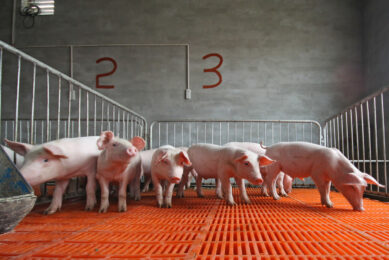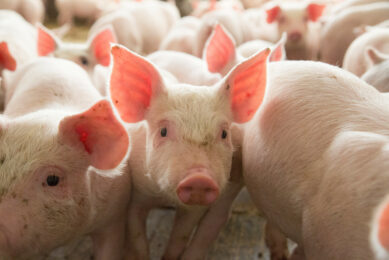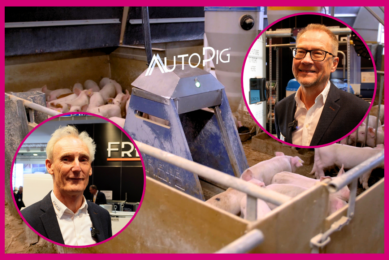Research: Phytase-xylanase effect in pig diets
University of Alberta (Canada) in cooperation with Danisco investigated the effects of dietary crude protein and phytase–xylanase supplementation of wheat grain based diets on energy metabolism and enteric methane in growing finishing pigs.
Dietary crude protein (CP) reduction plus enzymes (e.g., phytase, xylanase) addition to pig diets can decrease nutrient excretion, and may reduce greenhouse gas emissions due to higher nutrient digestibility.
The objective was to study effects of CP reduction and phytase and/or xylanase inclusion in pig diets on enteric CH4 production, animal performance, dietary metabolizable energy content and nutrient utilization.
Trial setup
In a randomized complete block design, 72 gilts were housed individually and fed for ad libitum consumption 6 wheat grain based diets being:
high CP control (Con),
low CP with added amino acids and phosphate (LP+),
low CP without phosphate (LP−),
LP− diets with added phytase (Phy),
LP− diets with added xylanase (Xyl), and
LP− diets with added phytase plus xylanase (PX)
Results
Mean daily gain, feed intake and gain:feed was not affected by dietary treatment.
Dietary CP reduction tended to increase nutrient, but not energy digestibility. Dietary CP reduction increased N retention and tended to increase C retention, thereby tending to increase dietary net energy content.
The P reduction decreased aNDFom and ADFom digestibility, but had no effect on N and C balance or energy metabolism.
Phytase and xylanase addition increased aNDF, ADF and P digestibility. Other than increasing dietary digestible energy content with phytase addition, phytase and xylanase addition did not affect C, N or energy balance.
Xylanase and phytase did not act additively. Dietary CP reduction decreased enteric CH4 production, but did not affect exhaled CO2. Dietary CP reduction decreased daily N, C and P excretion.
The P reduction and phytase or xylanase addition did not affect exhaled CO2, enteric CH4 output or N and C excretion.
Phytase and xylanase addition, but not P reduction, decreased P excretion.
Conclusion
Results indicate that feeding low CP and P diets with added synthetic amino acids and phytase to finisher pigs optimized utilization of dietary energy, minimized nutrient excretion and lowered enteric CH4 production by pigs, while maintaining or improving pig performance.
This article is part of the special issue entitled: Greenhouse Gases in Animal Agriculture – Finding a Balance between Food and Emissions.











